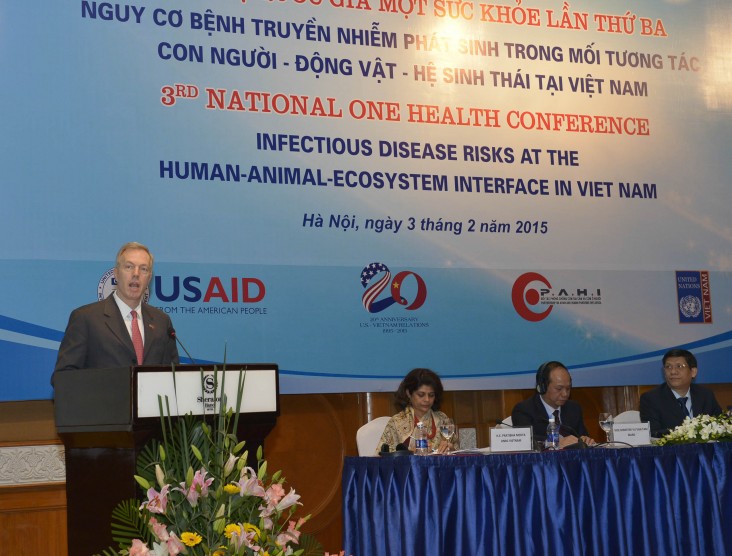
HANOI, February 3, 2015 -- It is my pleasure to join you in opening this important conference on “One Health - Infectious disease risks at the human-animal-ecosystem interface in Viet Nam.”
Vietnam is showing strong leadership to prevent, detect and respond to serious infectious disease threats. The U.S. Government is proud to support that leadership.
Vietnam’s success in One Health is important because, over the past several decades, three-quarters of emerging human diseases are caused by pathogens originating from animals.
Previously unknown infectious diseases at the animal-human interface include those caused by viruses such as HIV, highly pathogenic avian influenza, and more recently H7N9 influenza and Ebola.
The environment, human encroachment on wild animal habitats, and climate change have the potential to exacerbate the emergence of disease, and may, for example, expand the reach of malaria, which is a continuing threat to Vietnam. The speed with which these diseases can spread in our interconnected world presents serious public health, economic, and development challenges.
These infectious disease links among animals, humans, and the environment drive the effort for intersectoral collaboration, which we know as “One Health.” We can see the “One Health” idea at work in Vietnam’s effective coordination across sectors to address the problem of avian influenza. We see it at work in Vietnam’s efforts to achieve comprehensive disease detection and response in both the animal and human health sectors.
These are global issues. The US Government considers One Health to be a key contributor to the Global Health Security Agenda, an international partnership established under President Obama’s leadership to accelerate progress toward a world safe and secure from infectious disease threats.
In Vietnam, we have the active engagement and support of the U.S. Centers for Disease Control and Prevention and of USAID in the Global Health Security Agenda. One Health and Global Health Security also form core elements of USAID’s Emerging and Pandemic Threats Program, now beginning its second 5-year cycle. USAID has contributed more than $60 million to Vietnam through these programs. And One Health and Global Health Security are an integral part of CDC’s Animal-Human Interface Program since 2009, and Global Health Security Program since 2013.
The Government of Vietnam has shown its own strong commitment to Global Health Security, by leading the world in addressing zoonotic diseases, and by establishing an Emergency Operations Center. The Ministry of Health will formally launch its Emergency Operations Center this afternoon.
Because the development of an integrated One Health system extends well beyond any one sector, we must share the burden. Government, NGOs, UN and other technical agencies, civil society, universities, mass organizations, the private sector, the media and the community must all be part of this effort.
We know that key Government ministries and others, with support from PAHI, are actively pursuing the best mechanism for unified national One Health coordination, chaired at the highest level possible, to oversee the implementation of the national One Health strategy for prevention, identification, control and mitigation of future emerging zoonotic disease risks in Viet Nam.
On behalf of the United States Government, I would like to express great appreciation for the leadership of the Government of Vietnam, and the collaboration of partners in combatting national, regional, and global infectious disease threats.
We ere committed to support the strengthening of national coordination on One Health. Only together can we ensure a safer and healthier future for the people of Vietnam and the world.
Thank you to all of you.
I wish everyone good health and success.
Chúc mừng năm mới Ất Mùi. Chúc quý vị và các bạn mạnh khỏe, hạnh phúc và thành công.







Comment
Make a general inquiry or suggest an improvement.